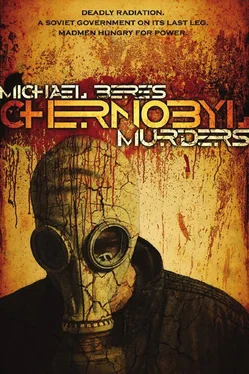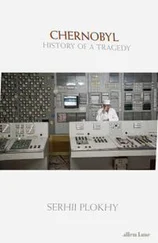Michael Beres - Chernobyl Murders
Здесь есть возможность читать онлайн «Michael Beres - Chernobyl Murders» весь текст электронной книги совершенно бесплатно (целиком полную версию без сокращений). В некоторых случаях можно слушать аудио, скачать через торрент в формате fb2 и присутствует краткое содержание. Жанр: Триллер, на английском языке. Описание произведения, (предисловие) а так же отзывы посетителей доступны на портале библиотеки ЛибКат.
- Название:Chernobyl Murders
- Автор:
- Жанр:
- Год:неизвестен
- ISBN:нет данных
- Рейтинг книги:4 / 5. Голосов: 1
-
Избранное:Добавить в избранное
- Отзывы:
-
Ваша оценка:
- 80
- 1
- 2
- 3
- 4
- 5
Chernobyl Murders: краткое содержание, описание и аннотация
Предлагаем к чтению аннотацию, описание, краткое содержание или предисловие (зависит от того, что написал сам автор книги «Chernobyl Murders»). Если вы не нашли необходимую информацию о книге — напишите в комментариях, мы постараемся отыскать её.
Chernobyl Murders — читать онлайн бесплатно полную книгу (весь текст) целиком
Ниже представлен текст книги, разбитый по страницам. Система сохранения места последней прочитанной страницы, позволяет с удобством читать онлайн бесплатно книгу «Chernobyl Murders», без необходимости каждый раз заново искать на чём Вы остановились. Поставьте закладку, и сможете в любой момент перейти на страницу, на которой закончили чтение.
Интервал:
Закладка:
A few minutes later, a man with an AKM came in and announced that the women and children were nowhere to be found. Komarov told the man to keep watch for them but, more importantly, to watch for Detective Horvath and to shoot him on sight. When the man with the AKM went back outside, Komarov noticed the man with the machine pistol staring at the phonograph. He shouted at the man, ordering him to tie Bela to his chair with rope from the room-divider curtain.
Soon everything was back as it had been, the music playing, Komarov sitting in the dark watching the doors and smoking, Bela staring at the television. Except now the women and children were gone, and this could mean only one thing. Horvath would soon arrive.
The rope holding Bela to the chair was wrapped tightly, and his wrists were tied behind him. His nose bled, and he no longer smiled as he had when Komarov slapped him.
The violin of Lakatos cried its song of despair into the night, and for a moment Lazlo imagined he was back in his apartment in Kiev, lying in bed listening to Lakatos on his phonograph. None of what had brought him to Kisbor on a cool night in May had happened.
In a few seconds it all flashed before him again. Mihaly in the wine cellar; months later the confession of his affair on a snow-covered playground outside the apartment. Tamara with him when he heard about the explosion. The roadblocks and confusion. The news of Mihaly’s death from bureaucrats at the Ministry of Energy.
Juli arriving in his office at militia headquarters. Had the visit by Andrew Zukor and his wife at the farm had another purpose? Was it possible Zukor had somehow convinced Mihaly to…
No! Komarov had created a pretense of guilt out of Mihaly’s and Juli’s personal lives. Komarov had arranged the circumstances, causing Lazlo to do something he thought he would never do again. He’d killed an innocent man. He’d shot an innocent man and watched him die, resurrecting the image of the Gypsy on the Romanian border. Komarov was obviously trying to create counterrevolutionary scapegoats for what had happened at Chernobyl.
But to what end?
With the music playing, with the memories of what he’d seen in the dead agent’s eyes and the dead Gypsy’s eyes and in Komarov’s eyes, Lazlo knew there was more. Komarov needed to destroy him, destroy his family, destroy Juli.
The violin of Lakatos crying out over the plateau gave way to the faster czardas, the rest of the orchestra joining in. In the distance, looking like overbright fireflies in Lazlo’s night vision, flashlights danced about the house. Lazlo used the opportunity to circle the house. He stayed at the ridge of the hill and was able to count ten men wielding flashlights. While he ran, he thought of the story his father had told, the German troops coming up the hill, only their helmets visible as his father and mother climbed down into the wine cellar.
The faint light of the village was behind Lazlo as he pushed through the weeds approaching the gravel road going up the hill.
He held his watch up and saw it was almost ten o’clock. He was about a hundred meters from the house. A flashlight swept across the side of the house, pausing at the open bedroom window.
The open window, Bela’s signal telling him Nina and Mariska and the children had escaped into the wine cellar. The men with flashlights were searching for the women and children, searching in an ever-widening circle. It was time. Bela was expecting him at ten, and Lazlo knew Komarov must be in the house waiting for him.
Lazlo considered posing as a drunk walking along the road.
He’d stagger up the hill whistling to the music. The men would come, and he’d pretend to speak only Hungarian. But there were too many men. He’d never break free and be able to get to the house without being sprayed by AKM fire. Then he remembered what Bela had told him earlier in the day. A man was stationed on the south edge of the road at the ridge of the hill.
Lazlo crouched low and ran. If the man was at his post, he’d have to disarm him, get the AKM, and make a run on the house.
But more likely, the man had left his post and was part of the search.
He could hear the men speaking to one another above the scream of Lakatos’ violin.
The road was close. Lazlo went down on his hands and knees and crawled ahead, feeling stones digging into his knees, the same stones he and Mihaly had, years ago, hurled from the yard as they helped their father clear a place to plant the private plot.
The men came closer, their legs dragging through dry weeds as they approached the ridge of the hill. Lazlo stayed low, crawled with his face to the ground. Suddenly, near the road, he came upon a clearing about a meter wide. His hand brushed something, a coat on the ground, its inside lining still warm. The man guarding the road had used the coat to stay warm or to sit on. The man was one of those with flashlights. Lazlo crouched low and lay down at the edge of the circular clearing on the side nearest the road. He listened and waited because he knew the KGB agent who had made the nest would soon return.
The stage was set. Everything he had done for the last two decades had led to this. Even times of weakness when the bottle had him in its grasp played a role. He had devoted his life in preparation for this confrontation.
East of the Carpathians, others could easily be arrested to confirm the conspiracy originating in the United States and funneled through here. Anger over Chernobyl would intensify, making prosecution less complicated. Chernobyl traitors would be part of the Soviet Union’s future. Whether Gorbachev remained in power or not, Komarov’s plan would succeed.
Komarov felt stronger than he had in years. When it was over, he would go to Moscow without the media fanfare used in capitalist countries. It was not the Russian way. By going quietly, he would add to his power. He would accept his medals with dignity and stand with the best of them high above others at the May Day parade. In the crowd, he would see a young blond woman look up to him. Later, at a Kremlin reception, he would meet the young woman, a Pravda reporter doing a story on the revival of Russia’s superiority over the other Soviet republics. Gorbachev would be no more, and the new president would have befriended Deputy KGB
Chairman Grigor Komarov.
After the Kremlin reception, the Pravda reporter would return with him to his room at the Hotel Metropole. They would order cham-pagne and speak of their new Mother Russia long into the night.
She is sweet. He can smell her. She puts her head on his shoulder and fingers the buttons of his uniform. She unbuttons his jacket and reaches beneath it. She finds the knife in the inside pocket and asks about it. He tells her the story of Sherbitsky, the murderer.
They make love. She becomes his mistress. They meet monthly at his dacha. He does not kill her. Instead, she stays with him as he grows older, wiser.
In the midst of Komarov’s reverie, Bela glared at him and spit off to the side. It seemed a provocation demanding action. He imagined rising from the chair and pistol-whipping the brute. But he did not move. Instead, he aimed the pistol at Bela, and this calmed him.
After a few more minutes of thrashing about in the weeds, it sounded as if the men were retreating to the house. Above the din of the music, Lazlo heard footsteps coming closer to the clearing. But instead of one man returning to the nest, it sounded like two. He kept his hand on his pistol as the men approached. The men stopped near his feet. He looked up and could see them facing the house. If one of the men stepped back, Lazlo would be kicked or stepped on, but he dared not move. The two men began speaking, young men.
“Komarov will have a poker up his ass now. When Brovko returns, you’ll really hear it.”
Читать дальшеИнтервал:
Закладка:
Похожие книги на «Chernobyl Murders»
Представляем Вашему вниманию похожие книги на «Chernobyl Murders» списком для выбора. Мы отобрали схожую по названию и смыслу литературу в надежде предоставить читателям больше вариантов отыскать новые, интересные, ещё непрочитанные произведения.
Обсуждение, отзывы о книге «Chernobyl Murders» и просто собственные мнения читателей. Оставьте ваши комментарии, напишите, что Вы думаете о произведении, его смысле или главных героях. Укажите что конкретно понравилось, а что нет, и почему Вы так считаете.












